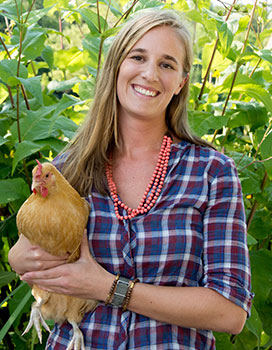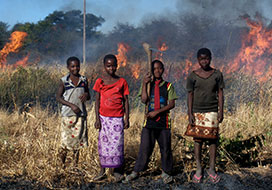Grad student working with partners on two continents to help save kids, wildlife

Sarah Dumas DVM ’12 is making a difference for people, animals, and ecosystems in Africa. For her graduate project, Dumas is establishing chicken egg laying facilities in rural parts of Zambia, a novel program aimed at improving the nutrition of small children and families that may also decrease villagers’ reliance on poaching and on burning fields for hunting.
But for Dumas, it’s all about the kids.
“In Zambia, I can’t think of any single issue that’s more important than childhood nutrition,” because of the long term impacts of nutrition on growth and a person’s ability to contribute to their household and community. “It’s the basis of a community’s ability to develop. With my veterinary degree and my interest in public health, I feel that increasing the availability of animal-sourced foods is my niche.”
Dumas began her work in Zambia as a veterinary student in 2009, building on the work of other students participating in the Expanding Horizons Program, in which Cornell veterinary students pursue career-related experiences in developing nations. She’s working with her faculty advisor, Dr. Alex Travis, as well as Dr. Sera Young and Dr. Rebecca Stoltzfus in the Division of Nutritional Sciences, and the organization Community Markets for Conservation (COMACO), to set up community-owned egg laying facilities at twenty locations in Zambia’s Luangwa Valley. The results of a pilot program in which Dumas helped communities create three egg production facilities doubled the egg consumption in surrounding households and increased the incomes of the egg producers by 44%.

“The focus of my Ph.D. project is taking that pilot one step further and creating a system for rural livestock production that can be economically and environmentally self-sustaining and can be replicated throughout Zambia to increase the availability of animal-sourced foods in poor rural communities,” says Dumas. She and her colleagues will compare communities with egg layer facilities against control communities to identify whether the programs increase the consumption of eggs by women and children, improve overall diet quality, and enhance child growth, and to ensure the facilities are profitable for the four to five individuals who own and run each one, 80 percent of whom are women.
If it works, the program to make eggs more available to communities in the Luangwa Valley could be good news for wild animals, too, since families will no longer have to rely as heavily on poaching to get by. In Dumas’ opinion, laws against poaching aren’t the most effective way to help these villages if they are enforced in isolation.
“Poaching laws in the absence of some sort of food alternative could hurt children,” says Dumas. “This is my attempt to provide that alternative.” Dumas and Travis are actively seeking additional funding to complete a substudy of the impact the project may have on bushmeat consumption.
More available food could also bring an end to another common practice in the area: children will often burn fields and meadows to expose mouse nests, which they then dig up to gather rodents for cooking and eating at home. Dumas hopes that by providing a reliable and sustainable source of animal-based food to these villages, children will no longer have to put themselves and their surrounding ecosystems at risk with this dangerous practice.
“The idea is to increase household incomes, pull families out of poverty, and decrease their reliance on nonrenewable natural resources,” Dumas says.
After graduating with her Ph.D., Dumas has her eyes on a job at a non-governmental organization like CARE or Heifer International to carry out and evaluate projects that help improve the lives of people in developing nations.
This story originally appeared in our 2015 Annual Report.


